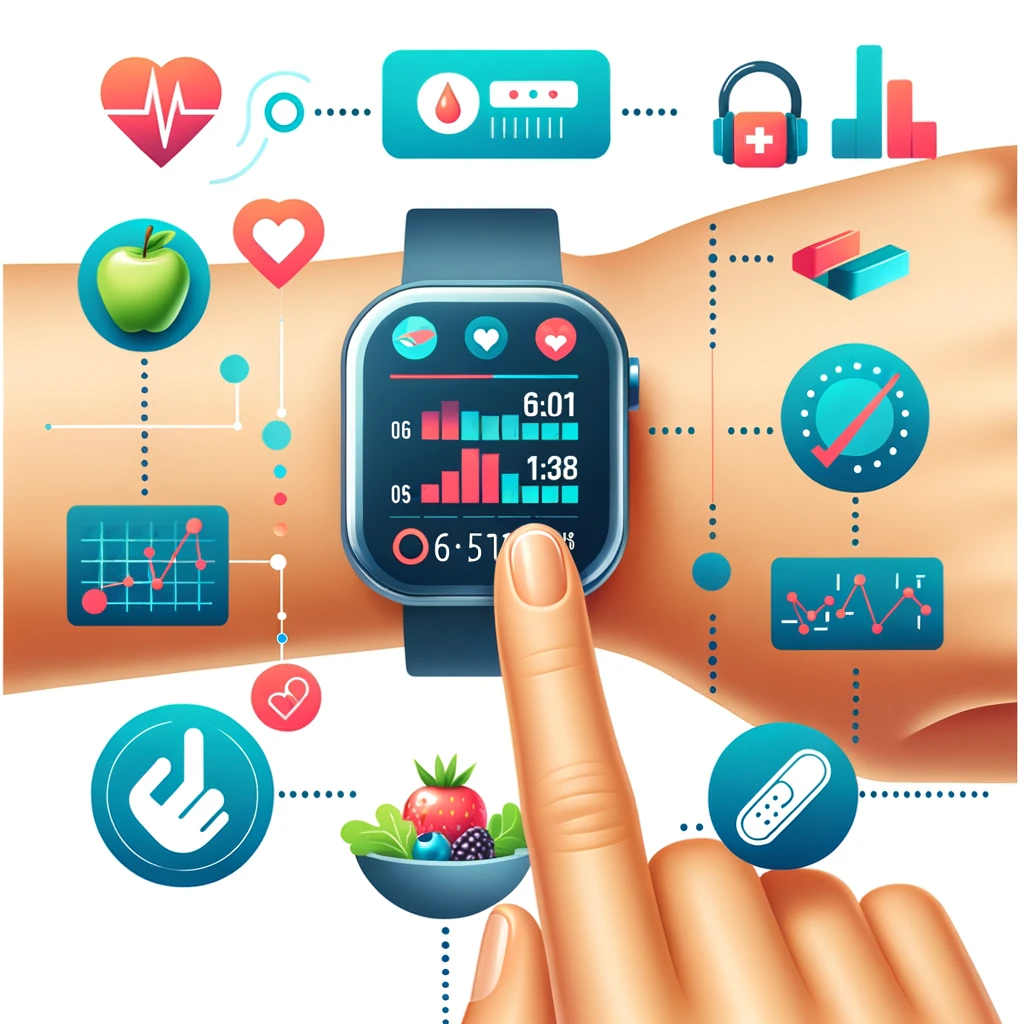In an age where tackling obesity and diabetes have emerged as global health concerns, the quest for innovative and effective solutions has never been more urgent. As these conditions continue to affect millions worldwide, the spotlight has turned to artificial intelligence (AI) as a beacon of hope. Countries around the globe are pioneering AI initiatives aimed at revolutionizing the way we approach weight management and diabetes control.
From the bustling tech hubs of the USA to the advanced research centers of Japan, international efforts are showcasing the power of AI in crafting personalized, data-driven strategies for health and wellness. This blog delves into the seven leading global AI initiatives that are setting new standards in the fight against obesity and diabetes, highlighting the unique contributions of each country leading the charge.
Table of Contents
The Impact of AI on Global Health and Tackling Obesity

Artificial intelligence is transforming healthcare as we know it, offering unprecedented tools for predicting, analyzing, and managing complex health issues. In tackling obesity and diabetes, AI stands out for its ability to harness vast amounts of data, delivering insights that can lead to more effective treatments and preventive measures. The United States, China, and the European Union are at the forefront of this revolution, investing heavily in AI research and development to unlock new possibilities in health management.
In the USA, AI-driven platforms are being developed to enhance patient care through predictive analytics, identifying individuals at high risk of obesity and diabetes before the conditions escalate. Meanwhile, China’s strides in AI technology focus on large-scale data analysis, enabling healthcare providers to offer personalized recommendations based on an individual’s genetic makeup and lifestyle factors. The European Union, with its robust data protection laws, is pioneering secure and ethical AI applications in healthcare, ensuring patient data is used responsibly to inform health decisions.
These global efforts underscore the potential of AI to not only improve individual health outcomes but also reduce the overall burden of obesity and diabetes on healthcare systems. By leveraging AI’s analytical prowess, countries are paving the way for a future where health management is more proactive, personalized, and effective.
Global AI Initiative #1: Smart Nutrition Apps (USA)

The United States has been a frontrunner in the development of smart nutrition apps, leveraging AI to revolutionize the way individuals approach diet and nutrition. These apps go beyond simple calorie counting; they use complex algorithms to analyze personal health data, dietary preferences, and lifestyle choices to create customized meal plans aimed at achieving specific health goals, including weight loss and diabetes management.
One standout example is an app that uses AI to suggest meals based on your nutritional needs, food preferences, and even your grocery shopping habits. By scanning barcodes or inputting meals, users receive real-time feedback on their dietary choices, along with suggestions to improve their nutritional intake. Success stories abound, with many users reporting significant weight loss, improved blood sugar levels, and a better understanding of their nutritional needs.
The impact of these smart nutrition apps is profound. They empower individuals to take control of their health, offering personalized advice that can lead to lasting lifestyle changes. Moreover, these apps can adjust recommendations based on progress and feedback, ensuring that dietary plans evolve to meet changing health goals and preferences.
However, the success of these apps isn’t just in their technology but also in their accessibility. By making personalized nutrition advice available at the touch of a button, the USA is setting a new standard for dietary management, making it easier for individuals to make informed choices about their health.
AI Initiative #2: Wearable Fitness Devices (South Korea)

South Korea’s contribution to the global fight against obesity and diabetes comes in the form of advanced wearable fitness devices. These gadgets are not mere pedometers; they are equipped with AI capabilities that analyze physical activity, sleep patterns, heart rate, and more to offer tailored fitness advice.
By syncing with smartphones and utilizing apps, these devices provide a comprehensive overview of an individual’s physical health, offering insights that can help adjust workout intensities, durations, and types. The AI in these devices learns from each user’s behavior and physical responses, optimizing exercise recommendations to maximize weight loss and improve metabolic health.
The popularity of these wearables in South Korea is attributed to their convenience and the growing public interest in health and fitness. Users appreciate the motivational boost these devices offer, making it fun and engaging to stay active and monitor progress towards their health goals.
Critically, these wearables also play a significant role in diabetes management. By encouraging regular physical activity and providing data that can indicate potential health issues before they become severe, they are an essential tool in preventive health measures.
In conclusion, South Korea’s investment in wearable fitness technology demonstrates a forward-thinking approach to health management, blending convenience with sophisticated AI analysis to encourage a healthier, more active lifestyle.
AI Initiative #3: Virtual Health Assistants (UK)

The United Kingdom is pioneering in the realm of virtual health assistants, AI-driven platforms that offer personalized health coaching and management. These virtual assistants are designed to support individuals in their journey to manage weight and control diabetes by providing tailored advice, reminders for medication and exercise, and emotional support to maintain motivation.
Virtual health assistants in the UK are becoming increasingly sophisticated, capable of conversational interactions that make users feel supported and understood. They analyze user input and health data to give personalized feedback and suggestions, from diet and exercise to stress management techniques, all of which are crucial for controlling diabetes and managing weight.
One of the key advantages of these virtual assistants is their availability. They offer 24/7 support, ensuring that individuals have access to health guidance whenever they need it. This constant support system is particularly beneficial for diabetes patients who require regular monitoring and lifestyle adjustments.
Moreover, these AI assistants are designed with privacy and data security in mind, addressing concerns about personal health information. By providing a secure and private platform for health management, the UK’s virtual health assistants are setting a benchmark for the integration of AI in healthcare.
The success stories emerging from users of these virtual health assistants highlight their potential to significantly improve quality of life. Individuals report better adherence to medication and exercise regimes, improved dietary habits, and a deeper understanding of their health conditions, all contributing to better weight management and diabetes control.
AI Initiative #4: Predictive Analytics in Healthcare (Canada)

Canada’s foray into the use of AI for health management is marked by its investment in predictive analytics. This technology uses AI to analyze health data and predict potential health risks, enabling early intervention strategies that can prevent obesity and diabetes before they escalate.
Predictive analytics in healthcare works by analyzing patterns and trends from a vast array of data sources, including electronic health records, genetic information, and lifestyle factors. For individuals at risk of obesity or diabetes, these insights can lead to personalized prevention plans that may include dietary changes, exercise programs, and lifestyle adjustments tailored to their specific needs and risk factors.
Canadian healthcare providers are leveraging predictive analytics to identify populations at high risk and implement community-wide health initiatives aimed at promoting healthy lifestyles and preventing the onset of chronic diseases. This proactive approach not only helps individuals but also reduces the overall burden on the healthcare system.
The benefits of predictive analytics in healthcare are vast, from improved patient outcomes to more efficient use of resources. By identifying risks early, healthcare providers can focus on prevention and early intervention, leading to better health outcomes for individuals and communities alike.
AI Initiative #5: Personalized Fitness Programs (Australia)

In the quest to combat global health issues like obesity and diabetes, Australia is at the forefront, leveraging artificial intelligence (AI) to develop personalized fitness programs. This initiative marks a significant departure from one-size-fits-all fitness regimens, embracing the diversity of individual health needs and preferences.
The Role of AI in Tailoring Fitness Solutions
At the heart of Australia’s approach is the use of AI algorithms to sift through vast amounts of health data, including physical activity levels, personal health metrics, and lifestyle choices. By analyzing this data, AI can design workout plans that are not only tailored to the individual’s current fitness level but also to their specific health goals, whether it’s weight loss, blood sugar control, or overall fitness improvement.
What sets these personalized fitness programs apart is their dynamic nature. AI doesn’t just set a plan and end there; it continuously learns from the user’s progress, feedback, and any changing health metrics. This ensures that the fitness regimen evolves in real-time, adapting to the user’s needs and maintaining its effectiveness.
Transforming Health Outcomes
The impact of these AI-driven fitness programs in Australia has been profound. Users report significant improvements in managing their weight and controlling diabetes symptoms. For many, the key has been the personalized aspect of these programs. They’re not just following generic advice; they’re engaging in activities that are specifically designed for their situation, making the exercises more effective and enjoyable.
Success stories from the initiative often highlight not just physical health improvements but also increases in motivation and engagement with one’s health journey. The tailored approach helps individuals feel seen and supported, enhancing their commitment to maintaining an active lifestyle.
From Users’ Perspectives
Testimonials from Australians who have participated in these programs often touch on the life-changing nature of the experience. One user shared, “For the first time, I felt like my fitness app truly understood my challenges with diabetes and offered me a workout plan that I could not only manage but also enjoy. It’s been a game-changer for my health.”
Another user noted the adaptability of the program: “Whenever I hit a plateau or my schedule changed, the app adjusted my workouts accordingly. It felt like having a personal trainer in my pocket.”
Looking Ahead
Australia’s personalized fitness programs represent a significant step forward in using technology to address health challenges. As AI technology continues to advance, the potential for these programs to become even more customized and effective is enormous. The success of this initiative serves as a model for other countries looking to harness the power of AI in health and fitness.
The future of managing obesity and diabetes may well lie in these smart, adaptable solutions that understand the unique needs of each individual, offering a path to better health that is as personalized as it is effective.
AI Initiative #6: AI in Medical Imaging for Early Detection (Germany)

Germany’s pioneering use of artificial intelligence (AI) in medical imaging is revolutionizing the early detection of conditions related to obesity and diabetes. Through sophisticated AI algorithms, medical imaging technologies like MRI and CT scans can now identify subtle signs of disease that were previously undetectable or easily overlooked.
Enhancing Diagnostic Accuracy with AI
AI’s role in medical imaging involves the analysis of images to detect anomalies indicative of diseases such as fatty liver, a common obesity-related condition, or diabetic retinopathy in diabetes patients. By training AI models on vast datasets of medical images, German researchers have developed systems capable of recognizing patterns and markers of disease with remarkable precision.
This advancement allows for much earlier intervention, significantly improving patient outcomes. Early detection is crucial in managing obesity and diabetes, as it enables healthcare providers to implement treatment plans that can prevent the progression of these conditions and their associated complications.
Real-World Impact and Applications
One notable application of AI-enhanced medical imaging in Germany is in screening programs for at-risk populations. By identifying individuals with early signs of obesity-related diseases or diabetes, healthcare professionals can offer targeted lifestyle and medical interventions, significantly reducing the risk of severe disease.
Patients who have benefited from early detection through AI imaging share stories of gratitude, emphasizing how this technology has given them a fighting chance against the progression of chronic conditions. Healthcare providers also laud the efficiency and accuracy that AI brings to diagnostic processes, allowing for more timely and effective patient care.
Future Prospects and Challenges
As this technology continues to evolve, the potential for AI in medical imaging extends beyond obesity and diabetes to a wide range of diseases. The challenge lies in ensuring equitable access to this advanced diagnostic tool and maintaining the privacy and security of patient data. Nonetheless, Germany’s leadership in this field is setting a global standard for the integration of AI in healthcare.
AI Initiative #7: Genomic Analysis for Personalized Health (Japan)

Japan’s focus on genomic analysis represents a cutting-edge approach to personalized health, particularly in the context of obesity and diabetes management. By utilizing AI to analyze genetic information, Japanese researchers are uncovering insights into individual predispositions to these conditions, paving the way for highly customized health recommendations.
AI’s Role in Deciphering Genetic Data
The core of this initiative lies in the ability of AI to process and interpret complex genetic data at an unprecedented scale and speed. This analysis can identify specific genetic markers associated with an increased risk of obesity and diabetes, allowing for personalized prevention strategies that cater to the unique genetic makeup of each individual.
For those at risk, this might mean tailored dietary guidelines, exercise plans, or early interventions that can significantly alter the trajectory of their health. The power of AI in this context is in its capacity to provide actionable insights derived from a person’s genetic blueprint.
Transforming Health Management
The implications of AI-driven genomic analysis for health management are profound. Individuals gain insights into their health risks that were previously impossible, empowering them to make informed decisions about their lifestyle and healthcare.
In Japan, success stories from this initiative highlight the transformative potential of personalized health recommendations based on genetic analysis. Individuals report feeling more in control of their health and better equipped to make changes that positively impact their well-being.
Navigating the Future
As genomic analysis becomes more integrated into healthcare, the challenge will be to ensure that these powerful tools are used ethically and responsibly, with a focus on enhancing patient care and outcomes. Japan’s pioneering work in this field is not only advancing the fight against obesity and diabetes but also opening new frontiers in personalized medicine.
By harnessing the power of AI in genomic analysis, the future of healthcare looks promising, with the potential for truly personalized approaches to prevention and treatment that account for the unique genetic makeup of each individual.
Challenges and Ethical Considerations

As the integration of AI in health initiatives to combat obesity and diabetes progresses, it’s crucial to address the challenges and ethical considerations that accompany technological advancement. The global embrace of AI in healthcare brings to light issues related to data privacy, algorithmic bias, and equitable access to these innovations.
Data Privacy and Security
The collection and analysis of personal health data by AI systems raises significant concerns about privacy and data protection. Ensuring the security of sensitive information and preventing unauthorized access are paramount. The countries leading these initiatives must adhere to stringent data protection laws and employ robust cybersecurity measures to safeguard patient information.
Algorithmic Bias
Another challenge is the potential for algorithmic bias, where AI systems might display prejudice based on the data they are trained on. This can lead to disparities in the quality of care and recommendations provided to different demographic groups. Efforts are needed to ensure AI systems are trained on diverse datasets to mitigate bias and promote fairness in health outcomes.
Equitable Access
Lastly, the question of equitable access to AI-driven health solutions is critical. Advanced technologies should not be a privilege for the affluent or those in developed nations alone. Global collaboration and policy-making efforts are essential to ensuring these life-saving technologies are accessible to all, regardless of geographic location or economic status.
Future Directions and Innovations
The future of AI in managing obesity and diabetes appears promising, with ongoing research and development poised to introduce even more innovative solutions. Emerging technologies and approaches, such as machine learning models capable of real-time monitoring and prediction and the integration of AI with telemedicine, are expected to further personalize and enhance healthcare.
Advancements in AI and Machine Learning
Future advancements may include more sophisticated AI algorithms that can predict individual risk factors with even greater accuracy, offering preemptive recommendations to prevent obesity and diabetes before they manifest. Additionally, the integration of AI with wearable technology will continue to evolve, providing more detailed and actionable insights into users’ health.
The Role of Telemedicine
The expansion of telemedicine, accelerated by the global pandemic, presents an opportunity for AI to reach a wider audience. Virtual consultations, powered by AI, can offer personalized advice and support for weight management and diabetes control to those in remote or underserved areas, breaking down barriers to access.
Global Collaboration and Ethical AI Use
The path forward will require not only technological innovation but also a commitment to ethical AI use and global collaboration. Sharing knowledge, resources, and best practices across borders can accelerate progress in combating these global health challenges, ensuring the benefits of AI in healthcare are realized worldwide.
Conclusion
The exploration of the seven leading global AI initiatives offers a glimpse into the future of healthcare, highlighting the transformative potential of artificial intelligence in combating obesity and diabetes. From smart nutrition apps in the USA to genomic analysis in Japan, these initiatives underscore a shift towards more personalized, proactive, and accessible healthcare solutions.
As we look ahead, the challenges of data privacy, algorithmic bias, and equitable access remind us of the importance of navigating this new frontier responsibly. The collaboration between countries, coupled with a commitment to ethical practices, will be crucial in realizing the full potential of AI in healthcare.
The journey to harness AI in the fight against obesity and diabetes is just beginning. With continued innovation, collaboration, and vigilance, the promise of AI-driven healthcare—offering more personalized, effective, and equitable treatment and prevention strategies—is within reach. As we venture forward, it is the stories of improved health outcomes and enhanced quality of life that will truly define the success of these global AI initiatives.